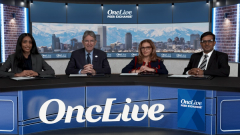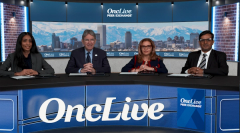
Toxicity Assessment of Precision-Engineered Allo-HSCT
Safety and toxicity data from a clinical trial investigating a novel, precision-engineered allo-HSCT conditioning regimen for older patients with high-risk blood cancers.
Episodes in this series

This is a video synopsis/summary of a Peer Exchange featuring Miguel-Angel Perales, MD; Nelli Bejanyan, MD; Amandeep Salhotra, MD; and Arpita Gandhi, MD, MS.
The panel discusses the toxicities observed with the Orca T-cell therapy (Orca-T) graft, a graft manipulation approach that involves adding regulatory T-cells and conventional T-cells (Tcons) to a CD34-selected graft. Due to tacrolimus alone, without methotrexate, patients experience minimal toxicities, faster engraftment, and earlier hospital discharge. The most notable change is the minimal incidence of mucositis, with only 2 patients (1 younger and 1 older) experiencing grade 3 or higher mucositis in the study presented.
The Orca-T platform is currently being evaluated in myeloablative transplants, and the next step is to assess its efficacy in reduced-intensity transplants. An ongoing study presented at the 2023 American Hematology Society Annual Meeting & Expo addresses this aspect. The panel emphasizes that the combination of conditioning regimen, methotrexate, and calcineurin inhibitor contributes to toxicity, making the age of 55 years a common cutoff for ablative vs reduced-intensity transplants.
Patients with hematologic malignancies, such as acute myeloid leukemia, acute lymphoblastic leukemia, and myelodysplastic syndrome, who have a matched donor and are eligible for myeloablative conditioning are considered for the Orca-T graft. Studies are also exploring the use of the Orca-T graft with reduced-intensity regimens and in mismatched and haploidentical donor settings, highlighting the adaptability of this platform. The addition of a defined population of Tcons promotes engraftment, even in mismatched or reduced-intensity settings.
Video synopsis is AI-generated and reviewed by OncLive® editorial staff.








































